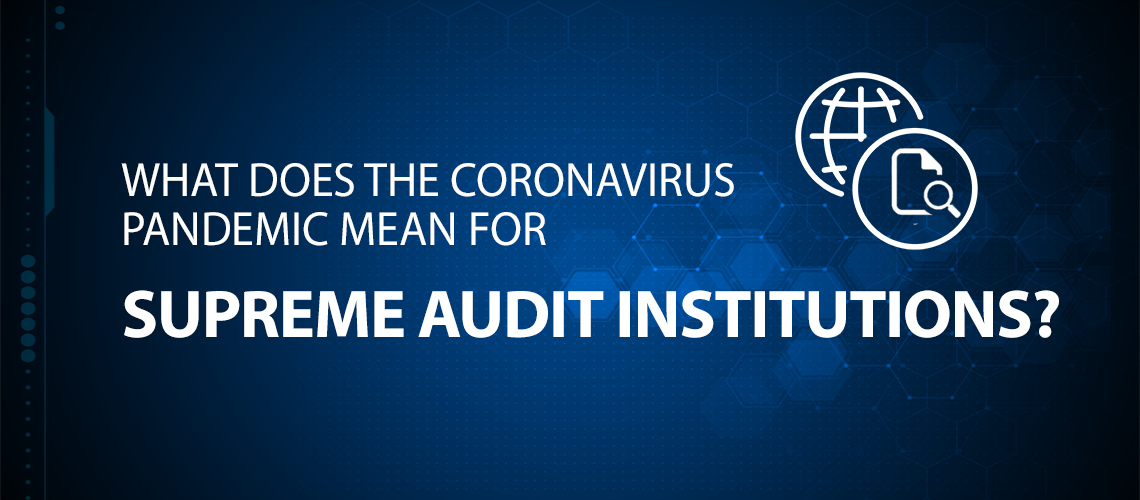 Graphic by World Bank
Graphic by World Bank
Only time will tell when the world starts recovering from the severe impact of the COVID-19 pandemic. Auditors, and in particular Supreme Audit Institutions (SAIs), will be able to provide insights on whether government systems were sound and prepared to face a crisis of this scale , whether their responses were reasonable, and how they can make improvements in the future. So, is it a holiday for auditors till then? Far from it.
Governments are taking drastic measures such as emergency laws, lockdowns, and travel restrictions. They are spending tremendous resources to purchase emergency medical equipment and supplies, build hospitals and morgues, provide stimulus funds to pay the underprivileged, and boost the economy. Controls and checks and balances have taken a back seat, opening opportunities for corruption. Some SAIs are trying their best to mitigate these risks while others are observing how the situation unfolds, but all are eager to learn from previous experiences and help curb the pernicious effects of corruption.
Supreme Audit Institutions can play an important role during crises. In 2015, for example, South Korea’s Board of Inspection and Audit (BAI) conducted an audit of the government’s response to the outbreak of MERS (Middle East Respiratory Syndrome). This audit found weaknesses in the response, including lack of transparency and training on early detection, as well as inadequate coordination and communication among authorities. The government and parliament acted quickly to address these weaknesses so that the country would be much better prepared for future pandemics.
Already in the midst of COVID-19, the Kuwait State Audit Bureau has been performing a real-time audit, as part of its ex-ante audit mandate. They have audited over $650 million worth of pandemic-related contracts so far and saved approximately $7 million.
These examples demonstrate what Supreme Audit Institutions can contribute, whether by performing a real-time audit to minimize fraud and corruption or post-crisis audits when countries face economic recessions. SAIs need to continue monitoring that public funds and public services are delivered properly. However, they face many challenges, including limited accessibility to auditees, technology infrastructure, and connections to perform remote audits, along with high expectations from key stakeholders on audits’ quality and timeliness.
To address these challenges, SAIs must adapt and reform. With COVID-19 affecting all countries, SAIs need to learn from previous case studies and create a repository of lessons learned, proactively communicate with stakeholders, and advise governments on ways to be prepared for future crises. There are challenges for private auditors as well; the International Auditing and Assurance Standard Board (IAASB) has already communicated that COVID-19 will significantly impact the way that audits are undertaken.
The auditing profession has been evolving for many years. SAIs have professional standards and guidelines on audits of disaster management, but COVID-19 will inevitably take this to the next level, requiring increased creativity, technology, and smarter auditing practices. The International Organization of Supreme Audit Institutions (INTOSAI), regional organizations, and development partners are currently coordinating on the future of the auditing profession in the context of disaster risk management.
The INTOSAI Development Initiative is strengthening its e-learning facilities and will be establishing a cooperative audit of Sustainable Development Goal 3, which aspires to have functional health systems everywhere that will not leave people behind, as some systems are at risk of doing with the current pandemic. For the Middle East and North Africa, the Arab Organization of Supreme Audit Institutions is currently developing a plan to help the region’s SAIs deal with pandemic-related audits. The World Bank is developing a discussion paper by crowdsourcing inputs from its teams who support SAIs, on experiences of auditing disaster management.
In the meantime, the issue of SAIs’ independence, a long-standing challenge that hampered the effectiveness of SAIs, will worsen during COVID-19. Though necessary in the current circumstances, emergency laws can give governments more power along with relaxed accountability. While the world anticipates a severe recession, every penny counts, and the independence of Supreme Audit Institutions to hold governments accountable and provide audits will be more important than ever. There will be no audit holidays in the foreseeable future.


Join the Conversation